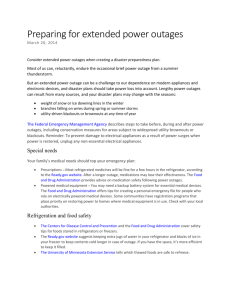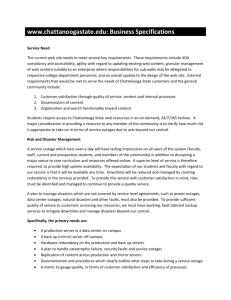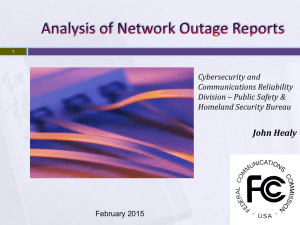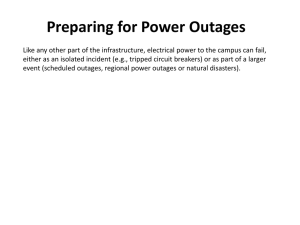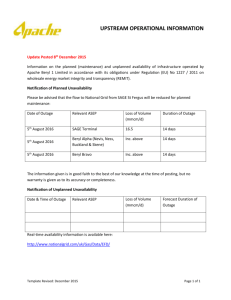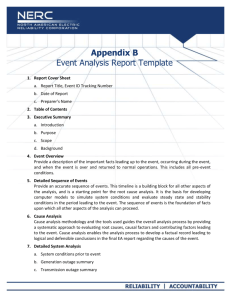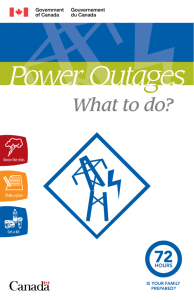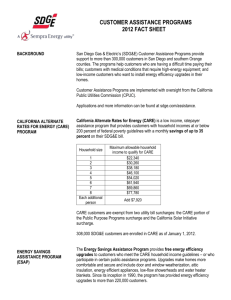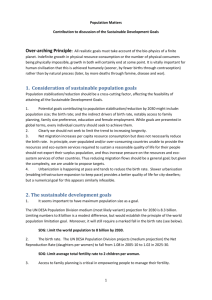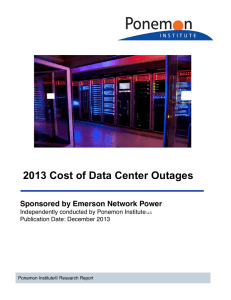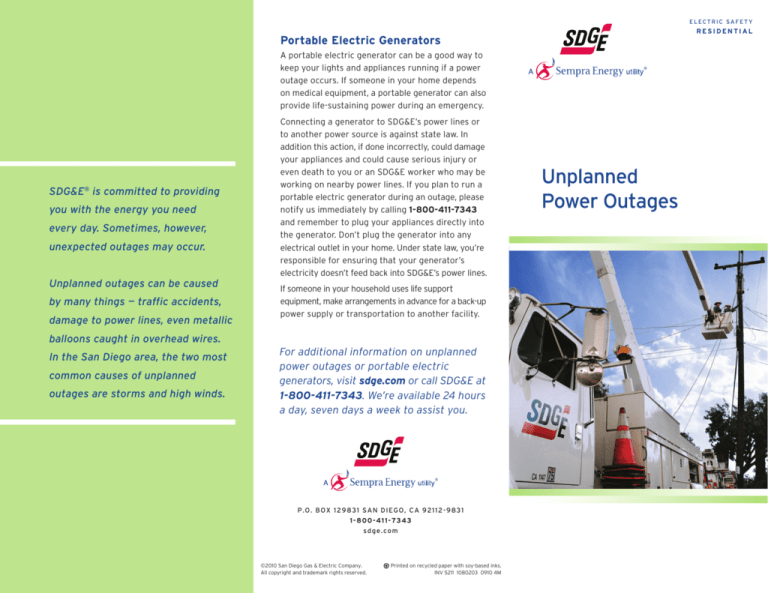
ELECTRIC SAFETY
RESIDENTIAL
Portable Electric Generators
A portable electric generator can be a good way to
keep your lights and appliances running if a power
outage occurs. If someone in your home depends
on medical equipment, a portable generator can also
provide life-sustaining power during an emergency.
SDG&E® is committed to providing
you with the energy you need
every day. Sometimes, however,
unexpected outages may occur. Unplanned outages can be caused
by many things — traffic accidents,
damage to power lines, even metallic
Connecting a generator to SDG&E’s power lines or
to another power source is against state law. In
addition this action, if done incorrectly, could damage
your appliances and could cause serious injury or
even death to you or an SDG&E worker who may be
working on nearby power lines. If you plan to run a
portable electric generator during an outage, please
notify us immediately by calling 1-800-411-7343
and remember to plug your appliances directly into
the generator. Don’t plug the generator into any
electrical outlet in your home. Under state law, you’re
responsible for ensuring that your generator’s
electricity doesn’t feed back into SDG&E’s power lines.
If someone in your household uses life support
equipment, make arrangements in advance for a back-up
power supply or transportation to another facility.
balloons caught in overhead wires.
In the San Diego area, the two most
common causes of unplanned outages are storms and high winds. For additional information on unplanned
power outages or portable electric
generators, visit sdge.com or call SDG&E at
1-800-411-7343. We’re available 24 hours
a day, seven days a week to assist you.
P.O. BOX 129831 SAN DIEGO, CA 92112-9831
1-800-411-7343
sdge.com
©2010 San Diego Gas & Electric Company.
All copyright and trademark rights reserved.
E Printed on recycled paper with soy-based inks.
INV 5211 1080203 0910 4M
Unplanned
Power Outages
U N P L A N N E D P O W E R O U TA G E S
Unplanned Outages
If your power goes out unexpectedly, the first thing
to do is check your circuit breakers or fuses. Your
power could be out because a circuit has tripped or a
fuse has blown. If so, simply reset the circuit breaker
or replace the fuse, and your power should be restored.
If you’ve checked your circuits or fuses and they are
properly connected, call SDG&E® at 1-800-611-7343
to report the outage. The information you provide
can also help to determine why the power went out.
Specific information such as what you saw or heard
when the power went out can be relayed to our
troubleshooters to help them locate the source of
the problem quickly.
SUPPLIES TO KEEP ON HAND
Consider having the following supplies handy in
case of an outage or emergency:
A flashlight with a supply of fresh batteries.
A portable, battery-powered radio so you can
keep up with news.
A telephone that does not depend on electricity.
Cordless phones will not function during an outage.
A supply of easy-to-prepare, nonperishable
foods. This includes packaged snacks, fruits
and bottled water and juices.
A wind-up or battery-operated clock.
A first-aid kit.
A manual can opener.
When you call, we’ll ask you for the following
information:
Your name, address and telephone number.
The approximate time the power was interrupted.
If the entire area is without power, or just your home.
If you saw or heard anything unusual when the
power went out.
If you can see any power lines on the ground.
In cases of widespread power outages, our phone
lines may be busy. Please be patient and try your
call again in a few minutes.
Use Our Automated System
For Faster Service
Use our automated system to quickly report
an unplanned power outage or to get updated
information, and receive the same information as our
customer service representative would give you without
the wait. Your current telephone number must match
the phone number we have on file to use the system.
Providing us with your current home telephone
number today can save you precious time tomorrow.
Call our automated system at 1-800-611-7343
24 hours a day, every day.
Restoring Power
When you report an unplanned outage, we send a
troubleshooter to the scene to assess the situation.
Most times, the troubleshooter can make the
necessary repairs on the spot. However, if there is
extensive damage, a special repair crew is called out.
Occasionally, repair crews have to remove barriers,
such as downed trees, or wait for floodwaters to
recede, before they can get to the outage location.
Once a troubleshooter or repair crew has been able
to determine the repairs needed to restore power,
we can provide time estimates for power restoration.
Estimates for power restoration are subject to
change as conditions permit. Safety is a top priority
for us; therefore, no SDG&E employee will be allowed
to work to restore power until it’s safe to do so.
Why Don’t I See an SDG&E Crew
or Troubleshooter in My Area?
Even if you don’t see SDG&E crews in your area,
we may be already working to restore your power.
Before we can restore service to your house, often
we need to repair damaged substations, transmission
lines and wires that feed power to your neighborhood. After restoring power to your general area,
we then repair any downed or damaged wires
between utility poles and individual homes.
My Neighbors Have Power, Why Don’t I?
Different parts of a neighborhood may be on
separate circuits. That means that the power
could come back on across the street, but you’re
still without power. Rest assured, we’ll continue
working until each and every customer has power.
Protecting Your Appliances
and Equipment
During an outage, SDG&E recommends you
unplug your sensitive equipment such as microwaves, computers, DVRs and televisions. Installing
sensors or surge protectors can help protect your
appliances and equipment from surges when the
power is restored.
It’s also a good idea to turn off any major appliances
like washers or air conditioners to prevent them
from unexpectedly coming on when the power
is restored. However, you may want to leave one
light on so you’ll know when the power is back on.
Double check to make sure all heat producing
appliances like stoves, toaster ovens, irons and
hair curlers, are turned off to minimize any fire
hazard if the power is restored while you’re away.
Keep your refrigerator and freezer doors closed to
help keep in the cold air and prevent food spoilage.
A closed refrigerator can keep food cold for up to
24 hours and a closed freezer can keep food frozen
for up to 48 hours. Dry ice can be used to help
protect the items in your refrigerator and freezer
during extremely long outages. Remember to use
gloves when handling dry ice, and don’t place it in
direct contact with food or drinks.

